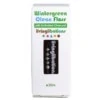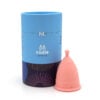Beauty Tips, Naïf
Neurodermitis bij baby’s – Wat te doen
Korstige huidplekken, jeuk… Babyneurodermitis kan onaangenaam zijn voor zowel ouders als kind, en kan vele oorzaken hebben. Maar dat alles is geen reden tot zorg, want er is veel wat je kunt doen om verlichten de symptomen van uw kind.
Een goede verzorging van de eczeemgevoelige huid betekent niet alleen het aanbrengen van een goede crème. Wij hebben alle belangrijke informatie verzameld om u te helpen uw baby zo goed mogelijk te beschermen tegen opflakkeringen van atopische dermatitis en om u te helpen de valkuilen van elk seizoen met uw baby zonder stress te doorstaan – en er is veel te ontdekken!

What is baby neurodermatitis?
Neurodermatitis is one of the most common skin diseases in children. Symptoms that can appear in babies and toddlers include itching, scaly skin or even cradle cap. Often, the signs of the disease become weaker as kids get older and eventually disappear completely. However, it can also persist into adulthood. If your baby has atopic dermatitis, there are many tried and tested tips on treatment and care. We’ve summed them up for you in this blog.
How does baby neurodermatitis develop?
The causes of baby neurodermatitis are still not fully understood. But there are some factors that can trigger or cause neurodermatitis:
Genetic disposition
Skin diseases can be inherited. For example, if one parent has atopic dermatitis, the likelihood that their baby will get the same skin disease is also increased. If both parents are affected, the probability that the baby will get neurodermatitis is naturally even higher.
Allergies and environmental factors
Pre-existing allergies and environmental factors can also affect the development of skin diseases. Babies who have an allergy to certain foods, animal hair or even pollen are therefore more likely to be affected by neurodermatitis. With this initial situation, so-called comorbidities can often occur, i.e. several diseases existing at the same time. If your baby suffers a neurodermatitis flare-up, other diseases can also break out at the same time.
Factors that can contribute to atopic dermatitis flare-ups:
-
Food intolerances
-
Uncomfortable, scratchy fabric on the skin
-
Allergies (pollen, nickel, animal hair)
-
Skin care products
-
Detergents and cleaning products
-
Hot water
-
Stress, psychological strain (for example due to big changes)
Wat kan worden gedaan tegen babyneurodermitis?
Als uw baby neurodermitis heeft, zal hij of zij last hebben van ernstige jeuk, vooral tijdens flare-ups. Naast professionele medische zorg zijn er veel dingen die u kunt doen om de symptomen te verlichten. Huidverzorging is de sleutel. Onze tips zijn de volgende:
-
Goede huidverzorging: Als je de zeer droge eczematische huid niet goed verzorgt, kunnen de symptomen verergeren. Kies een vochtinbrengende balsem om op de geïrriteerde huidplekken van je baby te smeren.
-
Korte vingernagels: Zorg ervoor dat de vingernagels van uw baby niet te lang zijn, zodat hij of zij niet aan de huid kan krabben. Katoenen handschoenen kunnen ook helpen tegen nachtelijk krabben.
-
Regelmatig baden: Een bad kan neurodermitis symptomen verlichten. Je moet ervoor zorgen dat het water niet warmer is dan 35 graden. Neem uw kind niet langer dan 10 minuten in bad, zodat het geen verkoudheid oploopt. U moet met uw kinderarts bespreken of en welke badadditieven u moet gebruiken. Breng na het bad altijd een vochtinbrengende crème aan.
-
Geschikte en comfortabele kleding: zweten verhoogt de symptomen van babyneurodermitis. Zorg er dus altijd voor dat de kleren van je baby ademend en los genoeg zijn. Als u nieuwe kleren koopt, moet u ze zorgvuldig wassen voordat u ze uw baby voor het eerst aantrekt.
-
Bescherm uw baby tegen nicotine: Vermijd kamers waar mensen roken en maak van uw huis een rookvrije zone. Passieve inhalatie van nicotine kan atopische dermatitis bij baby’s verergeren en is ook anderszins schadelijk voor de gezondheid.
-
Aangepaste voeding: Hoewel er geen specifiek dieet bestaat voor kinderen met atopische dermatitis, is een evenwichtig dieet belangrijk, zoals dat ook van cruciaal belang is voor mensen met huidaandoeningen. Let op voedselintoleranties bij uw kleintje en pas zijn voeding daarop aan.
De beste Naïf-producten voor babyneurodermitis
Alleen het beste voor de huid van je baby? Bij Naïf hebben we een aantal verzorgingsproducten ontwikkeld die ideaal zijn voor baby’s met een eczeemgevoelige huid. Onze parfumvrije verzorgende crème is bijvoorbeeld een echte allrounder en bevat bovendien alleen ingrediënten die de babyhuid echt nodig heeft.
Conclusie: De ontwikkeling van baby-eczeem is afhankelijk van vele factoren en de oorzaak wordt nog niet volledig begrepen. Maar er zijn veel manieren waarop u uw baby liefdevolle zorg kunt geven en episodes van neurodermitis kunt verlichten. Huidverzorging staat bovenaan de prioriteitenlijst en kan bijzonder kindvriendelijk worden gemaakt met de vele natuurlijke verzorgingsproducten van Naïf.






























 Beauty Producten
Beauty Producten Merken van A-Z
Merken van A-Z Welzijn
Welzijn Gezondheid / Voeding
Gezondheid / Voeding